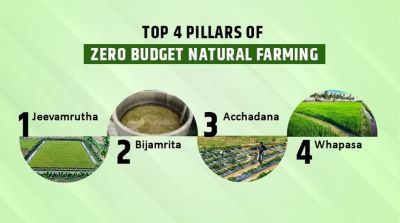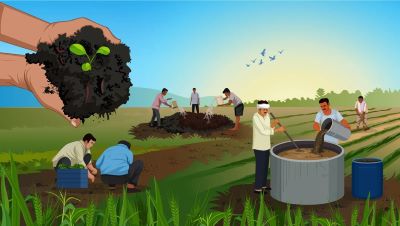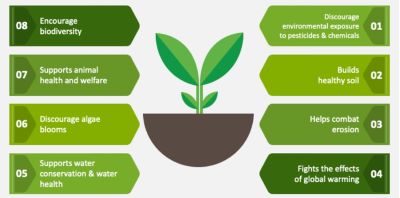Context:
In her Budget proposals for 2024-25, Union Finance Minister Nirmala Sitharaman announced that in the next two years, one crore farmers across the country will be initiated into natural farming supported by certification and branding. Implementation will be through scientific institutions and gram panchayats, adding that 10,000 need-based bio-input resource centres will be established.
Mission of the National Mission on Natural Farming (NMNF)
Objective:
The National Mission on Natural Farming (NMNF) aims to encourage farmers to transition to chemical-free farming practices. The government seeks to promote natural farming based on its merits, requiring a behavioral shift from chemical-based inputs to locally-produced, cow-based inputs. The NMNF is designed to foster this change through a comprehensive scheme under the Bharatiya Prakritik Krishi Paddhati, with a financial outlay of ₹4,645.69 crore allocated for the six-year period from 2019-20 to 2024-25.
Components of the Mission
● Training and Capacity Building
Training and Capacity Building will involve organizing training sessions and workshops for farmers, extension agents, and other relevant stakeholders. A network of master trainers and resource experts will be created to facilitate the spread of chemical-free farming techniques.
● Research and Development
Research and Development efforts will encourage research on natural farming methods, integrating both traditional practices and modern innovations. This will include developing and refining natural farming models that are tailored to various agro-climatic conditions.
● Demonstration and Extension
Demonstration and Extension activities will involve setting up demonstration plots to showcase the advantages and techniques of natural farming. Extension services will be utilized to spread knowledge and practices to a broader audience, ensuring that the benefits of natural farming reach more farmers.
● Policy Support
Policy Support will be crucial, with the development of policies and guidelines to bolster natural farming initiatives. Incentives and subsidies will be offered to farmers who adopt chemical-free farming practices, encouraging wider participation in the mission.
Natural Farming
Natural farming is characterized by the absence of chemical fertilizers and pesticides. It promotes traditional, indigenous farming practices that emphasize:
● On-Farm Biomass Recycling: The use of on-farm biomass recycling, including biomass mulching.
● Cow Dung-Urine Formulation: Application of cow dung and urine as inputs.
● Pest Management: Managing pests through crop diversity and on-farm botanical concoctions.
● Exclusion of Synthetic Inputs: Avoidance of all synthetic chemical inputs directly or indirectly.
Focus and Benefits:
Natural farming aims to enhance natural nutrient cycling and increase soil organic matter. It is grounded in agro-ecology and integrates crops, trees, and livestock, making optimal use of functional biodiversity. Proponents of natural farming believe it can:
● Increase Farmers’ Income: Improve economic outcomes for farmers.
● Restore Soil Fertility: Enhance soil health and fertility.
● Environmental Health: Contribute to environmental sustainability.
● Greenhouse Gas Reduction: Mitigate and/or reduce greenhouse gas emissions.
|
Natural Farming
|
Challenges and Concerns of Transitioning to Natural Farming
Food Security:
Agriculture and food experts express reservations about a large-scale transition from chemical farming to natural farming in India, given its vast population and food security needs. Catering to such needs is complex and presents several challenges.
Yield Disparities:
Recent research published in the paper titled ‘Zero Budget Natural Farming (ZBNF): Implications for Sustainability, Profitability, and Food Security’ by the National Bank for Agriculture and Rural Development and the Indian Council for Research on International Economic Relations highlights significant disparities in outcomes from different studies on ZBNF, now known as Bharatiya Prakritik Krishi Paddhati.
Contrasting Findings from Studies:
● CESS and Institute for Development Studies Andhra Pradesh: The study conducted by the Centre for Economic and Social Studies (CESS) and the Institute for Development Studies Andhra Pradesh shows promising results for ZBNF. It indicates that lower costs of biological inputs have led to improved crop yields and increased farmers' incomes, thus enhancing food and nutritional security for those practicing ZBNF.
● ICAR and Indian Institute of Farming Systems Research (IIFSR): In contrast, the research by the Indian Council of Agricultural Research (ICAR) and the Indian Institute of Farming Systems Research (IIFSR) raises concerns about the sustainability and productivity of ZBNF. It reports a significant decline in yields, including a 59% drop in wheat yields and a 32% drop in basmati rice yields compared to integrated crop management methods. These reductions adversely impact food supply and highlight the need for further investigation.
Importance of Long-Term Experimentation:
The paper underscores the need for long-term experimentation before adopting natural farming as a nationwide practice. The conflicting findings from the Andhra Pradesh and IIFSR studies reveal divergent perspectives on the effectiveness and viability of natural farming methods.

Lessons from Sri Lanka
Need for Extensive Studies:
Before implementing a large-scale transition from chemical to natural farming, it is crucial to conduct extensive studies and assessments. This helps in understanding the potential challenges and implications of such a shift.
Sri Lanka's Experience:
● Policy Shift and Consequences: A few years ago, Sri Lanka embarked on a policy to adopt completely organic farming by banning the import of chemical fertilizers. This policy shift led to significant economic and political turmoil in the country.
● Impact on Farmers: Farmers faced severe difficulties in acquiring natural fertilizers, which led to a reduction in the yields of key crops, including rice, the staple food of the nation. This decline in agricultural productivity posed a serious threat to the country's food security.
● Economic and Social Repercussions: The reduction in crop yields contributed to a sharp escalation in food prices. The resultant economic strain led to widespread protests and unrest among the population.
Way Forward
Experts like M.S. Sidhu, a noted economist and former professor at Punjab Agricultural University, suggests that while natural farming could be beneficial on a localised level, its large-scale adoption in India requires careful consideration. Key points include:
● Local vs. Large-Scale Adoption: Natural farming might work for supplementary foodstuffs but could be problematic for staple crops like wheat and rice due to lower yields.
● Need for Rigorous Testing: Extensive scientific studies are necessary to assess the impact on yields and food security before nationwide implementation.
Implementation Strategy
● Collaborative Approach
Adopt a Collaborative Approach, partnering with state governments, agricultural universities, research institutions, and non-governmental organizations. Community-based organizations and farmer groups will be actively engaged in both the planning and execution stages to ensure that the mission is effectively implemented.
● Monitoring and Evaluation
Monitoring and Evaluation will be critical, with the creation of a comprehensive system to track the progress and impact of the mission. Data-driven methods will be employed to evaluate the effectiveness of interventions, allowing for necessary adjustments to be made.
● Public Awareness and Education
Public Awareness and Education will involve launching awareness campaigns to inform the public about the benefits of chemical-free farming. Various media platforms will be utilized to reach a larger audience and promote the mission’s goals, ensuring broad support and understanding of the initiative.
Conclusion
The debate on natural farming in India highlights the need for a balanced approach. While natural farming has potential benefits, its large-scale implementation must be backed by rigorous scientific evidence to ensure it does not compromise national food security.
|
Probable Questions for UPSC Mains 1. Discuss the objectives and components of the National Mission on Natural Farming (NMNF) introduced in India. Evaluate the potential benefits and challenges associated with transitioning to natural farming on a large scale. (10 Marks, 150 Words) 2. Analyze the findings of recent studies on Zero Budget Natural Farming (ZBNF) and their implications for food security in India. What lessons can be learned from Sri Lanka’s experience with organic farming policies, and how should they inform India’s approach to natural farming? (15 Marks, 250 Words) |
Source: The Hindu









